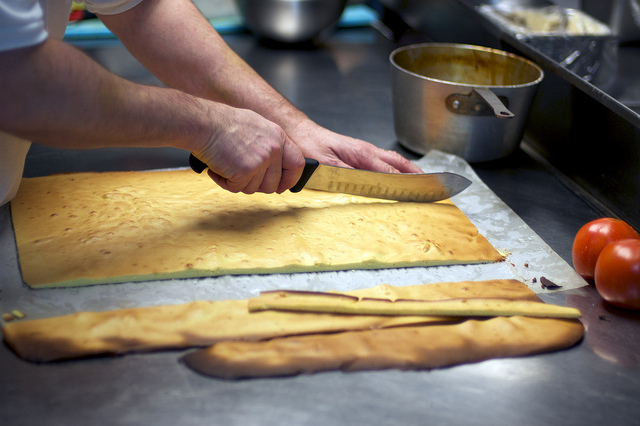One of the biggest mistakes made by fledgling home cooks is worrying too much about following recipes instead of learning techniques. They trudge through Step 1, Step 2, and Step 3, following the instructions to the letter, trying not to deviate from the recipe, but not really thinking about anything beyond exactly what’s written. Onions get chopped unevenly, stove top burners get cranked up too high, herbs get forgotten in the back of the fridge until the last possible minute. These cooks will finish the dish, and it might still be tasty , but cooking like this doesn’t teach you much, and poor practice doesn’t make perfect in the long run. If you’re cooking like this, you’re just following with recipes, when you should be working on improving the skills and techniques.
Learning the Key: Why Techniques Work Better
Of course, recipes and techniques aren’t really mutually exclusive; a recipe is just a combination of techniques and ingredients put together in a certain way to get a certain result. But here’s the difference: recipes can suck. Right now the internet is glutted with a huge range of recipes — some good, some bad, many in the middle — written by everyone from professional chefs to web-savvy grandmas. A theoretically delicious dish can be brought to its knees by a poorly written recipe in the hands of a novice cook.
Recipes can be unclear, confusing, poorly written, or simply written for more experienced cooks.
A technique can’t suck, in itself. A technique is just the action — searing, braising, chopping, mixing, etc. And improving your skills at performing a given technique can help overcome the strictures of a sub-par recipe.
Understanding what techniques you’re using and how to do them well opens up a whole world of variation to you that can correct for crappy recipe notes and allow you to improvise, experiment, and generally get better over time. It’s the difference between memorizing a specific piece of music in C minor, and understanding what playing in the key of C minor involves. Once you learn the key, then playing (and even composing) other songs in the same key becomes infinitely easier .
Mindful Cooking: Putting Techniques to Practice
Every time you make a new dish you’re probably going to encounter something new, or a new variation on the same concept. Next time you pull out the pots and pans to attempt a new recipe, ask yourself what techniques you’ll be using, step by step. By learning the basic concepts and practicing them, you can make a big difference in your cooking skills in the long run.
Figure out the techniques you use most frequently, and then try to perfect them.
Say you’ve decided to try your hand at beef bourguignon for dinner this Saturday night. While it’s can seem like a rather daunting dish for beginners, it’s a bit easier if you think of it terms of the building blocks of the dish: trimming the beef and vegetables before they’re added in turn; searing cubes of beef; sauteing onions to just the right level translucency. After you’ve finished your deliciously well-executed beef bourguignon, look for more recipes that use similar techniques to hone your skills even further. Mastering each of these is a small, manageable skill that can be applied to countless other recipes in the future.
The meta skills inherent to cooking are also good to think about. Keeping a clean, efficient work area and timing the stew so it’s ready at the same time as the other dishes you’re serving it with can be just as important to becoming a good chef as working with the ingredients themselves. Thinking about the different elements of a recipe’s process is key when it comes to cooking well.
Building Your Technical Cooking Repertoire
For a lot of people, especially those who are teaching themselves to cook and don’t have the benefit of an in-house mom, grandma or pro chef roommate to lean on, learning what’s going on at a chemical or physical level when you use given technique can be a useful method. Scientific chef-extraordinaire Alton Brown and Serious Eats’ J. Kenji Lopez-Alt both do a great job of walking through the specifics of different cooking techniques. Reading or watching some materials about general cooking processes and different methods can help you understand what to look for while you’re cooking — for instance, why you need to let a loaf of bread cool before you slice into it. Ultimately, knowing why and not just how can help improve your techniques through deeper understanding.
As with with any other technical skill, practicing is what makes you better. Practicing with technique in mind prevents you from getting stuck with the same old recipe over and over — instead of making a hundred batches of simple French bread to practice your kneading, you can find a new recipe every time (or every few times) to prevent yourself from getting taste bud burn out. So get out there and start practicing!
Image by Jeff Kubina via Flickr

